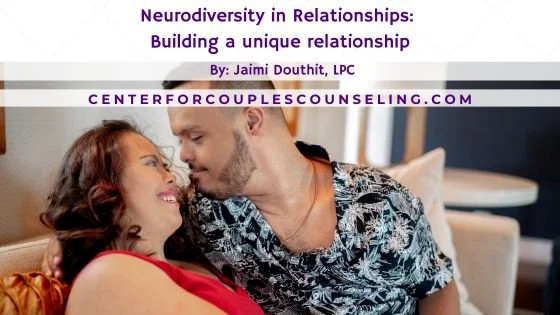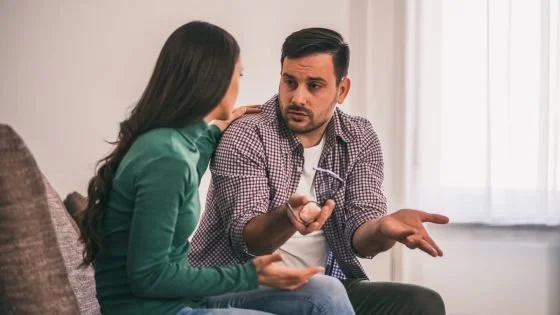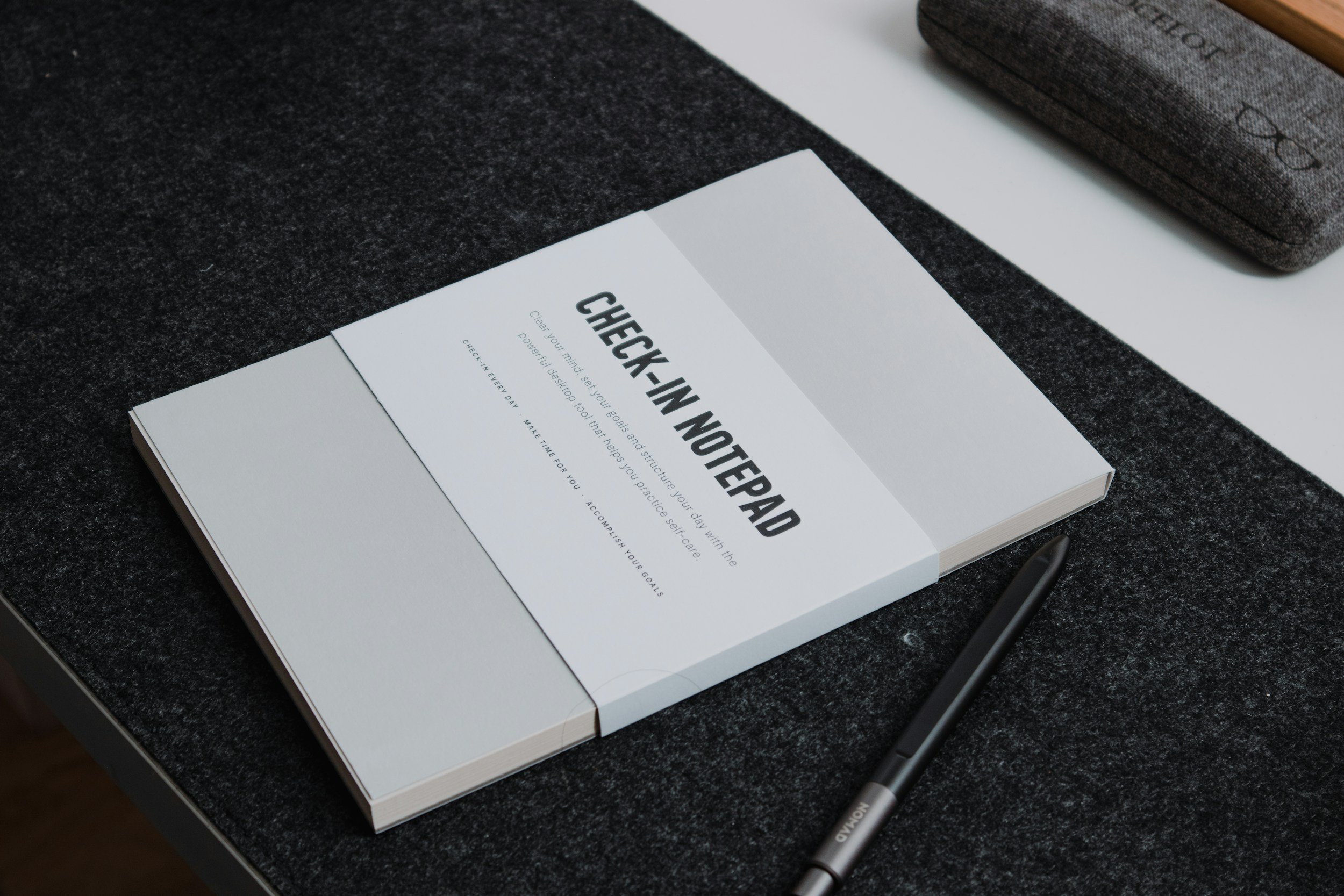Neurodiversity in Relationships: Building a Unique Relationship
Maneuvering through a relationship is challenging on its own with a blend of personalities, experiences and perspectives so when we think or know we are working with some neurodivergence within the relationship, it is important to consider how that impacts the people and functionality of that relationship. When neurodiversity is a part of that equation, it introduces an additional layer of complexity and necessary intentionality. My husband and I are both neurodivergent and what a journey it has been!
Neurodiversity refers to the idea that variations in the human brain, such as autism, ADHD, dyslexia, and other cognitive differences, are a natural and valuable part of human diversity. For couples where neurodiversity is present, understanding and embracing these differences can lead to stronger, more resilient relationships. This is going to be the case whether one or both partners are neurodivergent.
Even though we know that all relationships are unique, neurodivergence within a relationship really challenges the one-size-fits-all system with which many people approach relationships. I have learned over time that in my own relationship, it’s essential to recognize that each of our brains process information differently, which affects how we communicate, handle emotions, and interact with the world around us.
One example that I like to share is when I re-organized our bathroom closet. When I was done, I looked at the uniform opaque bins and sighed with happiness… my husband looked at it and said, “all of our stuff is gone!”. This happened because for him, out of sight is out of mind and I had absolutely crippled his ability to function as an independent adult by using these specific bins. So, what did we do? I went and found clear bins and re-re-organized the bathroom closet. Let me tell you, he hasn’t asked me where something is even once!
We have found that two key pieces of making our relationship as a neurodivergent couple work, is that it is important to understand the differences between us and value those unique strengths that we each have. Recognizing that an individual with ADHD may struggle with organization and time management or that someone with Autism may have a very specific routines. The need for direct communication is super important when we are finding ways to function together. I directly tell my husband if I am feeling disconnected because he cares, he just needs me to be honest and direct with him.
Some helpful tools we focus on are things like clear communication, active listening, developing routines, and regular check-ins. These are things we have fine tuned through the years, but let me give you some examples we run into and that I often see affecting those in couples counseling.
-Clear Communication: We know that people with neurodivergence may struggle with abstract language or implicit cues so being clear and direct minimizes confusion. An example that we have maneuvered through is that instead of saying, “I’m stressed”, “I need your support” or “The kitchen is a mess!”, I say, “I’m feeling overwhelmed with everything that is going on right now and I need you to support me by helping me clean up and reset the kitchen before we go to bed.” Now, we can work together to reset the space while increasing intimacy and connection because I have clearly asked for what I need and communicated when I needed it.
-Active Listening: This comes with intentionality and empathy when listening to your partner. Not only do we actually hear each other's words, we consider the emotion and needs behind the words. If my partner comes in and says, “The sky is green”, I can then just kinda decide he is losing it or I can clarify, “What I heard you say is that the sky is green…”, now my partner can come back and say, “Yea, the sky is green.”, “That’s what I said but not what I meant, I mean the sky is more green than usual.”, or “That’s not what I said”. Slow down the communication!
-Develop Routines: Not just for home care, for “us” care too. Routine can be a touchstone for people with neurodivergence who need to work exponentially harder with scheduling. Developing routines is also incredibly helpful because it allows predictability and support for managing responsibilities in the relationship, especially if we’re caring for others in the family system.
-Regular Check-ins: Ensuring that we set aside time to intentionally check in with each other is a big deal in all relationships, but especially in relationships with neurodivergence. This allows for a structured opportunity to discuss stressors regularly and before they escalate. We make this work by setting weekly check-ins with mini-daily moments of checking in.
These are a few practices that all add to a supportive environment, invaluable to individuals with neurodivergence. Creating a safe space in the relationship is such a huge piece of making a relationship with neurodivergence thrive; we want both partners feeling safe enough to discuss thoughts or emotions without the fear of judgment. It is also really helpful to have a counselor in your support system for the relationship because it would be totally okay to get stuck sometimes and knowing there is a trusted space to work it out can be a huge help.
Don’t forget that you also want to celebrate the uniqueness of your relationship and prioritize focusing on a common goal. This really supports the teammate feeling that we really love to see. Celebrating all this hard work is a great way to build intimacy, so find things to appreciate together like smooth communication or feeling supported during big feelings. The fact is, your relationship will be full of adjustments, so the willingness to adapt and evolve goes a long way on this journey!
Neurodivergence within a relationship brings forth the need to think outside the box but really, we should all be doing that within any relationship! Finding ways to ensure our partner is actually taking in what we are giving them makes a world of difference in the functionality of the relationship. Too often, society expects individuals with neurodivergence to just figure out how to exist in a neurotypical world so when we work hard to create a safe environment within the relationship to unmask, it can open opportunities of connection we didn’t know existed. Get creative and ask for help! Call us today!
My name is Jaimi Douthit and I’m a Licensed Professional Counselor at the Center for Couples Counseling. I love working with couples and individuals who are ready and motivated to make changes in their lives and relationships, who can handle feedback and encouragement, and engage in using the tools I teach in therapy outside of the therapy room. At the Center for Couples Counseling, we specialize in couples therapy, infertility counseling, postpartum mood and anxiety disorders, self-care and burnout, and perfectionism. We help couples and individuals in the League City and Houston areas in person, and all residents of the State of Texas online. Call us at (832) 827-3288 to schedule a free phone consultation.
Begin Couples Therapy in League City, TX
We know relationships take a lot of hard work. But your relationship is important and deserves the effort. At Center for Couples Counseling we want to help you and your partner get back on the right track. To get started with in-person or online couples therapy follow these simple steps:
Meet with one of our skilled couples therapists
Begin to see positive changes in your relationship
Other Services Offered at Center for Couples Counseling
At the Center for Couples Counseling, we understand you or your relationship may be facing different challenges. To help you work on yourself and your relationship, our Texas practice offers individual therapy, infertility counseling, postpartum anxiety, and depression counseling, therapy for self-care and burnout, and therapy for perfectionism. For more about us check out our FAQs and blog!






